大学英语 分钟试讲PPT
合集下载
大学英语试讲ppt课件

5
Teaching Contents Warming-up questions
(1) Did you admire Bill Gates ? Why?
Key tips: talented, rich and successful
6
Teaching Contents
• (2)Success and wealth, if you could only keep one, what would be your choice
2
Teaching Objectives
Understand the main idea and the structure of the text, and cultivate their independent learning ability Grasp the key language points and the grammatical structures in the text Conduct a series of reading, listening, speaking, writing, and translation activities related to the theme of this unit.
3
important points
Difficult points
Language points Words study: Grammar:
The difficult point is to know how to divide the whole article into parts and get the main idea of the text
选 外Uo语自rn教:liotv学《e3与新?:研视w究野e出英al版语th社教, 程su1c》cess
Teaching Contents Warming-up questions
(1) Did you admire Bill Gates ? Why?
Key tips: talented, rich and successful
6
Teaching Contents
• (2)Success and wealth, if you could only keep one, what would be your choice
2
Teaching Objectives
Understand the main idea and the structure of the text, and cultivate their independent learning ability Grasp the key language points and the grammatical structures in the text Conduct a series of reading, listening, speaking, writing, and translation activities related to the theme of this unit.
3
important points
Difficult points
Language points Words study: Grammar:
The difficult point is to know how to divide the whole article into parts and get the main idea of the text
选 外Uo语自rn教:liotv学《e3与新?:研视w究野e出英al版语th社教, 程su1c》cess
大学英语15分钟试讲PPT
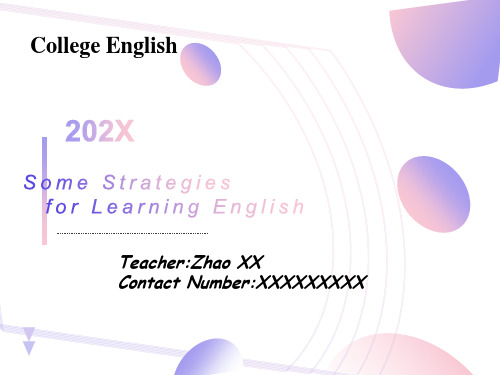
Words and Expressions
a nodding acquaintance: • A nodding acquaintance is a slight knowledge of
a person or a subject. I have a nodding acquaintance with French, but I
Reading skill: finding out the main ideas in paragraphs Writing skill: writing a paragraph of a general statement supported by specific details and reasons
Topic sentence
Part Three : Detail
1. Have
yDoouneovtetrrecaotmaplllanRienweedawdaobirndosugtinyoexuarctmlyemthoerysambeecawuasye.
you find it simply impossible to memorize all the new words
be bound to do sth: (be sure to ) She would be bound to like it! 她一定喜欢. You are bound to succeed if you learn more
useful sentence patterns. 如果你学习更多实用句型,你将成功征服英语! The earth's climate is bound to change
Sentence study
• Analyze the structure of the sentence. While is used as a conjunction, meaning “although” or “even though” I like tea while she likes coffee.
大学英语10分钟presentation-课件
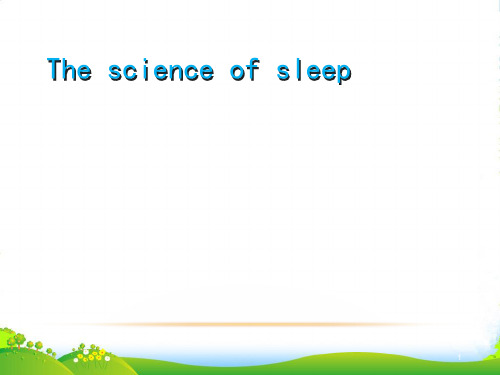
4
What happens when we sleep?
5
Non-REM sleep
6
7
REM sleep
• The first rapid eye movement (REM) period usually begins about 70 to 90 minutes after we fall asleep.
A hard night's sleep
10
Sleep tips and advice
11
Thanks for your watching !
12
都二
能分
运浇
用灌
好,
“八
二分
八等
定待
律;
”二
,分
我管
们教
一,
起八
,分
静放
待手
花;
开二
。分
成
➢ Pure of heart, life is full of sweet and joy!
The science of sleep
1
What’s your daily rhythm ?
• Do you consider yourself a morning person or an evening person ?
• At what time of day do you feel at your best? • Considering only your own "feeling best" rhythm, if you
Species Python巨蟒
Average total sleep time per day
18 hrs
What happens when we sleep?
5
Non-REM sleep
6
7
REM sleep
• The first rapid eye movement (REM) period usually begins about 70 to 90 minutes after we fall asleep.
A hard night's sleep
10
Sleep tips and advice
11
Thanks for your watching !
12
都二
能分
运浇
用灌
好,
“八
二分
八等
定待
律;
”二
,分
我管
们教
一,
起八
,分
静放
待手
花;
开二
。分
成
➢ Pure of heart, life is full of sweet and joy!
The science of sleep
1
What’s your daily rhythm ?
• Do you consider yourself a morning person or an evening person ?
• At what time of day do you feel at your best? • Considering only your own "feeling best" rhythm, if you
Species Python巨蟒
Average total sleep time per day
18 hrs
大学英语试讲精ppt课件

2
Word Study
3
Text Analysis
4
Text Understanding
5
Summary of the Text
6
Exercises
.
Before Reading
Global Reading
Detailed Reading After Reading
Unit 1 Some Strategies for Learning English
Section 1 :True or False
1. Language learners should memorize all the new words.
( F)
2. It’s impossible to cram too many words into your head
at a time. ( T )
1
Before Reading
2
Global Reading
3
Detailed Reading
4
After Reading
.
Part Two: Global Text Understanding
Section 1 : True or False Section 2: Division of the Text
• To improve students ’ability in oral presentation and demonstration.
.
Teaching Objectives
• 1. Learning key words and structures • 2. Talking about different cultures • 3. Reading skill: finding out the main ideas in
英文面试详细讲解ppt课件
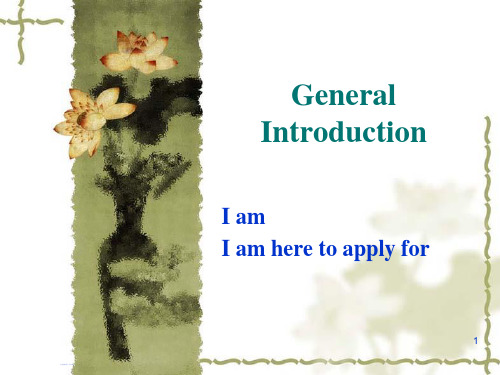
5
❖ Try to be funny if you can, but don’t force it; 可以的话,尽量说得幽默有趣
❖ Summarize your career and education, but don’t recite a list; 概括说出你的工作经验和学历,但切勿 背诵
❖ Don’t start with your date of birth; 不用提及你的出生日期
自己我介绍一下你自己
6
❖ Avoid information that is not career-related. The fact that you own a dog won’t get you a job 避免说 一些与职业无关的事,例如:你有一只狗,这并不 能为你争取到工作
❖ Always answer this question 经常思考和解答这条问题
16
❖ 13."What qualities do you feel are important to be successful in _____ (i.e. customer service)?" 哪些品 质在你看来对成功是最重要的?
❖ 14."What previous experience has helped you develop these qualities?" 哪些之前的精力帮助你获 得了这些品质?
什么对这份工作感兴趣? ❖ 3."What are your strengths?" 谈谈你的优势? ❖ 4."What is Your Biggest Weakness?" 谈谈你最
大的弱点是什么? ❖ 5."Why do You Feel You are Right for this
❖ Try to be funny if you can, but don’t force it; 可以的话,尽量说得幽默有趣
❖ Summarize your career and education, but don’t recite a list; 概括说出你的工作经验和学历,但切勿 背诵
❖ Don’t start with your date of birth; 不用提及你的出生日期
自己我介绍一下你自己
6
❖ Avoid information that is not career-related. The fact that you own a dog won’t get you a job 避免说 一些与职业无关的事,例如:你有一只狗,这并不 能为你争取到工作
❖ Always answer this question 经常思考和解答这条问题
16
❖ 13."What qualities do you feel are important to be successful in _____ (i.e. customer service)?" 哪些品 质在你看来对成功是最重要的?
❖ 14."What previous experience has helped you develop these qualities?" 哪些之前的精力帮助你获 得了这些品质?
什么对这份工作感兴趣? ❖ 3."What are your strengths?" 谈谈你的优势? ❖ 4."What is Your Biggest Weakness?" 谈谈你最
大的弱点是什么? ❖ 5."Why do You Feel You are Right for this
大学英语15分钟试讲[优质ppt]
![大学英语15分钟试讲[优质ppt]](https://img.taocdn.com/s3/m/9c05d77bdd36a32d72758111.png)
2. Do you have any trouble in learning English? If any, what is it?
Part Two: Global Text Understanding
True or False
1. Language learners should memorize all the new words.
4. Listening to English is good both to our sense of
hearing and to our speaking. ( F )
5. Language learners do not find many opportunities to
practice oral English at school. ( T )
• A topic sentence expresses the central idea, and close connection between the sentences, the sentences serves to back up the central idea.
• Paragraph= one topic sentence + supporting sentence + (A summary or Conclusion)
CollegeEnglish
Teacher:ZhaoXX ContactNumber:XXXXXXXXX
Teaching Aims
• Understand the text and reading for the main idea in a paragraph
• To grasp some keys words, phrases and useful sentence patterns
Part Two: Global Text Understanding
True or False
1. Language learners should memorize all the new words.
4. Listening to English is good both to our sense of
hearing and to our speaking. ( F )
5. Language learners do not find many opportunities to
practice oral English at school. ( T )
• A topic sentence expresses the central idea, and close connection between the sentences, the sentences serves to back up the central idea.
• Paragraph= one topic sentence + supporting sentence + (A summary or Conclusion)
CollegeEnglish
Teacher:ZhaoXX ContactNumber:XXXXXXXXX
Teaching Aims
• Understand the text and reading for the main idea in a paragraph
• To grasp some keys words, phrases and useful sentence patterns
大学英语教师试讲 ppt课件
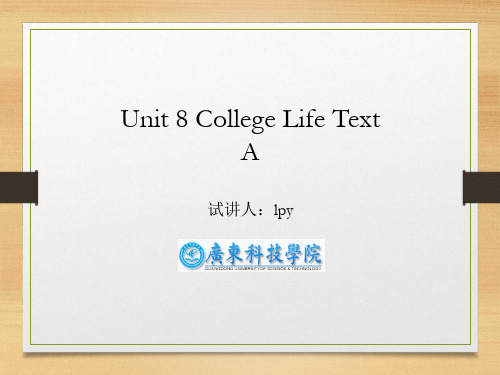
Reading & Text Comprehension
Text A: Secrets of Straight-A
Students
Taken from Improve Your English Through Comprehension Practice by Christina Lim Cher
Para. 1: Introduction
A professor of education says: It is far more important for a student to know:
How to make the most of his or her innate abilities.
Principle 8: (in para.5)
speak up and ask questions in class
Indication word: It is equally important
Reading & Text Comprehension
Principle 9: (in para.6)
Reading & Text Comprehension
Principle 5: (in para.4)
Sche word: It is also important
Principle 6: (in para.4)
Take good notes and use them
Reading & Text Comprehension
Principle 3: (in para.3)
Get organized
Indication word: also
Principle 4: (in para.3)
英语三分钟讲课PPT模板课件

英语三分钟讲课
this year from nose to tail dimension of metres in length. the longest house cat the length of cat five years old
英语三分钟讲课
the longest house cat the length of cat five years old
to tail dimension of metres in length.
英语三分钟讲课
the longest house cat the length of cat five years old this year from noseLONGESTHOUSE英语三分钟讲课
the longest house cat the length of cat five years old this year from nose to tail dimension of metres in length.
英语三分钟讲课
it's the biggest hamburger in the world. the world's highest statue Christ
biggest hamburger in the world. the world's highest
英语三分钟讲课
length of cat five years old
progress.
PPT科普:PPT是由微软公司推出的一款图形演示文稿软件,全称为“PowerPoint”,,大家都喜欢 说成英文PPT,也可以算做是缩写。中文名称叫“幻灯片”或“演示文稿”。一般与“投影仪”配 合使用,通常在培训、会议场合使用。也可将PPT打印成一页一页的幻灯片,可以将PPT保存到光 盘中以进行分发,并可在幻灯片放映过程中播放音频流或视频流。
大学英语10分钟presentationPPT

• Sleep deprivation not only has a major impact on cognitive functioning , but also on emotional and physical health. Moreover , it’ll arouse disorders such as sleep apnoea and the risk of obesity.
• We have around three to five REM episodes a night.
8
How much sleep is required?
People like to sleep anywhere between 5 and 11 hours, with the average being 7.75 hours.
4
What happens when we sleep?
5
Non-REM sleep
6
7
REM sleep
• The first rapid eye movement (REM) period usually begins about 70 to 90 minutes after we fall asleep.
The science of sleep
1
What’s your daily rhythm ?
• Do you consider yourself a morning person or an evening person ?
• At what time of day do you feel at your best? • Considering only your own "feeling best" rhythm, if you
• We have around three to five REM episodes a night.
8
How much sleep is required?
People like to sleep anywhere between 5 and 11 hours, with the average being 7.75 hours.
4
What happens when we sleep?
5
Non-REM sleep
6
7
REM sleep
• The first rapid eye movement (REM) period usually begins about 70 to 90 minutes after we fall asleep.
The science of sleep
1
What’s your daily rhythm ?
• Do you consider yourself a morning person or an evening person ?
• At what time of day do you feel at your best? • Considering only your own "feeling best" rhythm, if you
大学英语15分钟试讲PPT
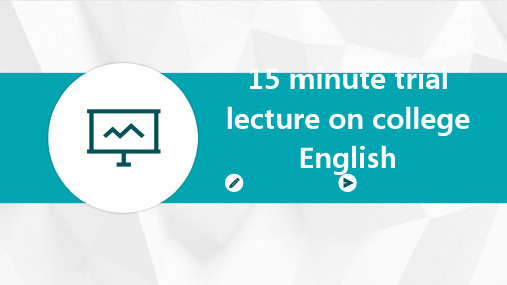
Course outline
01
Unit 1
Basic Grammar and Vocabulary:Introduction to basic grammar
structures and common vocabulary, with exercises and activities
to practice and improve.
Critical thinking
To foster students' critical thinking skills by encouraging them to analyze complex texts, evaluate arguments, and express their own opinions clearly and coherently.
03
Unit 3
Reading Comprehension:Introduction to different reading
strategies, critical thinking when reading, and practice with
different types of texts.
Course outline
Peer Reviews: Students
review each other's work, identifying grammar errors, vocabulary usage, and sentence structure.
Summative assessment
01
02
Purpose: To measure student performance at the end of a course or learning unit.
大学英语10分钟presentation[优质ppt]
![大学英语10分钟presentation[优质ppt]](https://img.taocdn.com/s3/m/ba9eeae5f121dd36a22d8211.png)
levels of cognitive skills , such
as speech, memory, innovative
and flexible thinking .
3
What would happen if we didn't sleep?
• With continued lack of sufficient sleep, the part of the brain that controls language, menmery, planning and sense of time is severely affected, practically shutting down.
Thescienceofsleep
1
What’s your daily rhythm ?
• Do you consider yourself a morning person or an evening person ?
• At what time of day do you feel at your best? • Considering only your own "feeling best" rhythm, if you
Species Python巨蟒
Average total sleep time per day
18 hrs
Tiger
15.8 hrs
Cat Chimpanzee黑猩猩
12.1 hrs 9.7 hrs
Sheep
3.8 hrs
African elephant Giraffe长颈鹿
3.3 hrs 1.9 hr
• We have around three to five REM episodes a night.
大学英语教师试讲课件

1. Write a passage about your own studying principles, and explain why they are good or not, and how to improve. Please try to use the structure learnt today. (200 words) Find related materials on the internet to read and try to share what you have got in the next class.
Reading & Text Comprehension
Principle 7: (in para.5)
Hand in neat work
Indication word: Another winning formula.
Principle 8: (in para.5)
speak up and ask questions in class
Taken from Improve Your English Through Comprehension Practice by Christina Lim Cher Kee
Reading & Text Comprehension
Reading & Text Comprehension
Para. 1: Introduction
Para2: by mastering a few basic principles that others can easily learn
Reading & Text Comprehension
Principle 1: (in para.2)
Reading & Text Comprehension
Principle 7: (in para.5)
Hand in neat work
Indication word: Another winning formula.
Principle 8: (in para.5)
speak up and ask questions in class
Taken from Improve Your English Through Comprehension Practice by Christina Lim Cher Kee
Reading & Text Comprehension
Reading & Text Comprehension
Para. 1: Introduction
Para2: by mastering a few basic principles that others can easily learn
Reading & Text Comprehension
Principle 1: (in para.2)
- 1、下载文档前请自行甄别文档内容的完整性,平台不提供额外的编辑、内容补充、找答案等附加服务。
- 2、"仅部分预览"的文档,不可在线预览部分如存在完整性等问题,可反馈申请退款(可完整预览的文档不适用该条件!)。
- 3、如文档侵犯您的权益,请联系客服反馈,我们会尽快为您处理(人工客服工作时间:9:00-18:30)。
• A topic sentence expresses the central idea, and close connection between the sentences, the sentences serves to back up the central idea.
• Paragraph= one topic sentence + supporting sentence + (A summary or Conclusion)
College English
Teacher:Zhao XX Contact Number:XXXXXXXXX
Teaching Aims
• Understand the text and reading for the main idea in a paragraph
• To grasp some keys words, phrases and useful sentence patterns
• To improve students ’ability in oral presentation and demonstration.
Teaching Objectives
• 1. Learning key words and structures • 2. Talking about different cultures • 3. Reading skill: finding out the main ideas in
Topic sentence
Part Three : Detail Reading
1. Do not treat all new words in exactly the same way. Have you ever complained about your memory because you find it simply impossible to memorize all the new words you are learning? But, in fact, it is not your memory that is at fault. If you cram your head with too many new words at a time, some of them are bound to be crowded out. What you need to do is to deal with new words in different ways according to how frequently they occur in everyday use. While active words demand constant practice and useful words must be committed to memory, words that do not often occur in everyday situations require just a nodding acquaintance. You will find concentrating on active and useful words the most effective route to enlarging your vocabulary.
4. Listening to English is good both to our sense of
hearing and to our speaking. ( F )
5. Language learners do not find many opportunities to
practice oral English at school. ( T )
Section 1 Topic sentence
• A topic sentence must be a complete sentence, not a fragment.
• A topic sentence is usually a clear and direct statement, not a question.
paragraphs • 4. Writing skill: writing a paragraph of a general
statement supported by specific details and reasons
Part One: Part Two: Part Three : Part Four : Part Five : Part Six :
Unit 1 Some Strategies for Learning English
1
Before Reading
2
Global Reading
3
Detailed Reading4ຫໍສະໝຸດ After Reading
Part One: Warm-up Questions
1. How do you study English? What do you think is the most effective way of learning English ?
( F)
2. It’s impossible to cram too many words into your head
at a time. ( T )
3. Listening to English occasionally will improve your ear
and speaking skills. ( T )
2. Do you have any trouble in learning English? If any, what is it?
Part Two: Global Text Understanding
True or False
1. Language learners should memorize all the new words.
Warm-up Questions Global Text Understanding Detail Reading Following-up Discussion Assignment Feedback
Before Reading
Global Reading
Detailed Reading After Reading
• Paragraph= one topic sentence + supporting sentence + (A summary or Conclusion)
College English
Teacher:Zhao XX Contact Number:XXXXXXXXX
Teaching Aims
• Understand the text and reading for the main idea in a paragraph
• To grasp some keys words, phrases and useful sentence patterns
• To improve students ’ability in oral presentation and demonstration.
Teaching Objectives
• 1. Learning key words and structures • 2. Talking about different cultures • 3. Reading skill: finding out the main ideas in
Topic sentence
Part Three : Detail Reading
1. Do not treat all new words in exactly the same way. Have you ever complained about your memory because you find it simply impossible to memorize all the new words you are learning? But, in fact, it is not your memory that is at fault. If you cram your head with too many new words at a time, some of them are bound to be crowded out. What you need to do is to deal with new words in different ways according to how frequently they occur in everyday use. While active words demand constant practice and useful words must be committed to memory, words that do not often occur in everyday situations require just a nodding acquaintance. You will find concentrating on active and useful words the most effective route to enlarging your vocabulary.
4. Listening to English is good both to our sense of
hearing and to our speaking. ( F )
5. Language learners do not find many opportunities to
practice oral English at school. ( T )
Section 1 Topic sentence
• A topic sentence must be a complete sentence, not a fragment.
• A topic sentence is usually a clear and direct statement, not a question.
paragraphs • 4. Writing skill: writing a paragraph of a general
statement supported by specific details and reasons
Part One: Part Two: Part Three : Part Four : Part Five : Part Six :
Unit 1 Some Strategies for Learning English
1
Before Reading
2
Global Reading
3
Detailed Reading4ຫໍສະໝຸດ After Reading
Part One: Warm-up Questions
1. How do you study English? What do you think is the most effective way of learning English ?
( F)
2. It’s impossible to cram too many words into your head
at a time. ( T )
3. Listening to English occasionally will improve your ear
and speaking skills. ( T )
2. Do you have any trouble in learning English? If any, what is it?
Part Two: Global Text Understanding
True or False
1. Language learners should memorize all the new words.
Warm-up Questions Global Text Understanding Detail Reading Following-up Discussion Assignment Feedback
Before Reading
Global Reading
Detailed Reading After Reading
